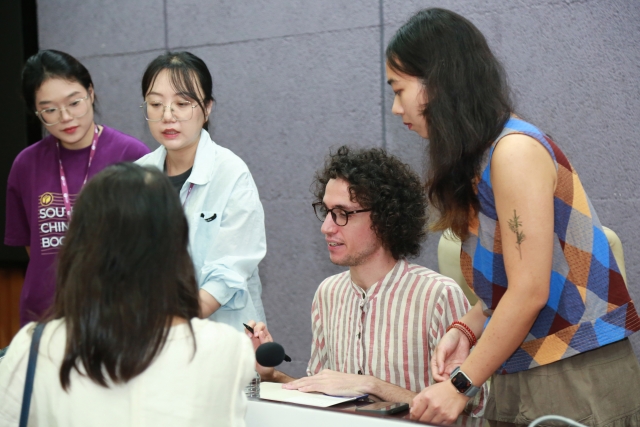On August 17, 2025, Italian writer Alessandro Ceschi, known as Ale, attended the Southern China Book Fair in Guangzhou to share his experience of writing in Chinese. Alongside other international authors, his presence was part of the fair's goal to transition from a local event to a global platform.

Ale signing books for readers at the Southern China Book Fair (Photo: Southern China Book Fair)
Back in the summer of 2016, like many young graduates, Ale had no clear plan for his future. After leaving a marketing job he didn't enjoy, a news article about China's booming film industry reminded him of his past experiences making documentaries and volunteering at film festivals. Inspired, he decided to study film in China, hoping to bridge China and the West.

Ale on a film set (Photo provided by Ale)
His filmmaking journey in China began with learning Chinese and gaining admission to the country's top film academy. Over the next few years, he lived across China: studying in Beijing, joining film crews in Dongguan, teaching Italian at a high school in Qingdao, and working in commercials in Shanghai. In 2024, his memoir, Dreaming in Mandarin, was published. In the place of the old dream was his new identity—a writer.

Ale's book Dreaming in Mandarin at the Southern China Book Fair 2025 (Photo: Chen Siyuan)
At the fair, Ale reflected on being an expat writing about China. While his foreign identity naturally draws attention, he emphasized his true focus: "I don't want to write cultural reports," he said. "I want to get closer to humanity itself. My work is about a young person trying to find his place in the world."
South: What feedback have you received from Chinese readers after Dreaming in Mandarin was published?
Ale: I've found that my experience as an "outsider" resonates widely, especially with readers who have lived abroad. For example, Chinese readers in Europe or the U.S., who are also "foreigners" in those countries, often comment that they see themselves in my attempts to approach unfamiliar cultures.
My book also explores the uncertainty and exploration of a young adult’s life. The six years after I graduated were a process of trial and error, constantly searching for direction without a clear goal. Many readers say they are going through similar periods of uncertainty, which makes them connect with my story.
South: In recent years, many "foreign" bloggers in China have gained large followings, and in literary studies, there is a field devoted to "China in the eyes of foreigners." What do you think of the attention that comes from being a Laowai (foreigner) in China?
Ale: I can't escape this identity. I can only accept all the good and bad experiences it brings. For example, you could call my book "Laowai literature," but it can also be seen simply as the story of a recent graduate navigating uncertainty in life. It doesn't have to be interpreted through the lens of being a foreigner.
What I aim for is a more genuine, human-centered expression. That's what studying at the film academy taught me: to focus on people themselves. I'm not trying to write a report on cultural differences. I'm confident that even if the book were translated into Italian, readers would still understand it. And that's what I am planning to do.
My only hope is that the attention tied to my foreign identity doesn't turn into expectations. If people assume that, because I'm a foreigner, I must write about certain things, I may not be able to meet those expectations. Writing, for me, is personal.
South: You are very active in interacting with Chinese people. Where does this strong desire to connect with others come from?
Ale: On one hand, it comes from the curiosity I had when I first arrived in China—a curiosity that has never left me. At the beginning, I knew very little about this country. The China presented in the news was an abstract concept, focused on political systems, and didn't show the lives of ordinary people. So initially, my curiosity was simple: I wanted to see what people here were thinking and how they lived.
Now, I see this curiosity more as a challenge to my own understanding. I will never fully understand China in my lifetime. I believe that anyone who claims to fully understand China, especially as an outsider, is mistaken. When I wrote this book, I didn't want to write from the perspective of a "foreign observer," because fully explaining China is almost impossible as the country is always changing.
South: How does it feel to be invited as an international author to the Southern China Book Fair?
Ale: It feels quite good, and also a bit emotional. Sharing my experiences here, at a place where China and the world intersect, makes you reflect on where you came from. Having lived in China for so many years, I usually don't think about this when doing talks in bookstores. But in a setting like this, there's a sense that 'the whole world is here,' and the idea that I have traveled a long way to get here feels quite nice.
You can see the Europe Pavilion, where there are wine and sausages from Germany, ice cream from France, and watches and earrings from Poland. I didn't expect to see all this; it is very tangible. You can walk from the Europe to the Central Asia pavilions, giving a sense of a 'global village.' I think even a small connection like this is meaningful and much needed today.
Reporter | Chen Siyuan
Photo | Chen Siyuan, Ale, Southern China Book Fair
Editor | Hu Nan, James Campion, Shen He






